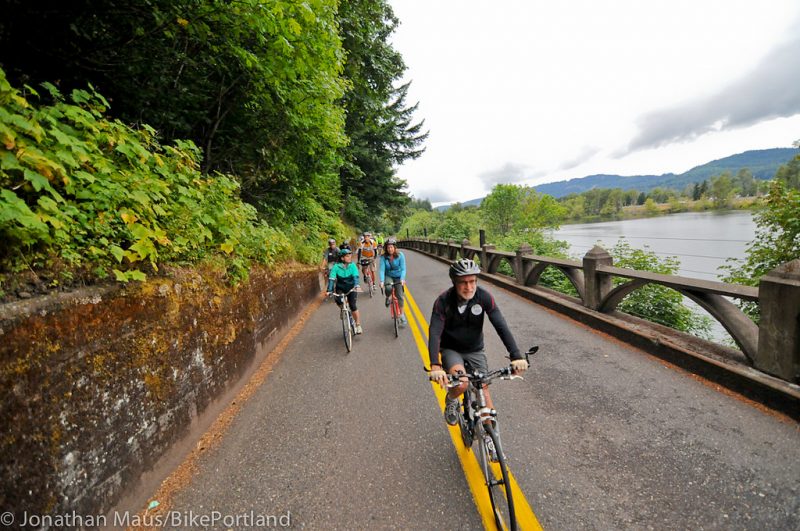
(Photo: J. Maus/BikePortland)
There’s been a steady trickle of news here on BikePortland in recent years from agencies and advocates who see a future for carfree traveling in the Columbia River Gorge. But it turns out the idea isn’t as futuristic as you might think.
“Transportation agencies were slow to respond. But it is encouraging to see the progress now being made.”
— Dave Wechner, who pushed for a carfree Gorge in 1989
A few days ago I heard from Dave Wechner, a land-use planner who owns a consulting business based in Coupeville, Washington. Wechner came across our article about the new Carfree Columbia Gorge website and he wanted to share a historical perspective: Nearly 30 years ago he did a graduate thesis based on, “reducing the negative impacts associated with intensive automobile traffic on the Columbia Gorge scenic highway.” He presented the thesis to the Columbia River Gorge Commission in June 1989 while working toward his Masters Degree in environmental studies at University of Oregon.
In his thesis summary (below), Wechner wrote that his hope was to, “Stimulate discussion to develop a new transportation strategy for the scenic highway, employing alternatives to private automobile traffic.” The idea motivated him because he felt fewer people using cars in the Gorge would reduce environmental impacts, enhance recreation and tourism potential, and improve safety on the roads.
Advertisement
[pdf-embedder url=”https://bikeportland.org/wp-content/uploads/2018/04/Grad-thesis-Exec-Summary.pdf” title=”Grad thesis – Exec Summary”]
Among the ideas in his plan were: tolls on private auto use and a permit system so only Gorge residents and their guests would have access to the Historic Highway; a system of shuttle buses; and the construction of several park-and-ride lots outside of the Scenic Area. His visionary proposal saw a linkage between the shuttles and existing TriMet service — the same model being used today by the Columbia Gorge Express service. Wechner also called for bike racks on the all the shuttle buses (three years before TriMet would add them) and a “share lane” for bicycles on the Historic Highway that would include, “boundary lines that drivers and bicyclists may use when passing.”
In an email, Wechner said the response from property owners to his idea of a toll and permit system on the Historic Highway ran the gamut, “From those who thought I was proposing to evict them for four months of the year, to others who figured out the result for them would be positive, as they wouldn’t deal with the crush of traffic on sunny weekends, people driving up and parking in their driveways, dumping garbage, etc.” He said people also liked the idea of how businesses would benefit from being located near park-and-ride locations.
As for transportation agencies, Wechner said, “They were slow to respond.” “But,” he added, “it is encouraging to see the progress now being made.”
Three decades after he pitched his plans, Wechner encouraged me to “Keep this issue alive in the minds of Portlanders — and in turn, others who look to the Northwest for innovation.”
— Jonathan Maus: (503) 706-8804, @jonathan_maus on Twitter and jonathan@bikeportland.org
Never miss a story. Sign-up for the daily BP Headlines email.
BikePortland needs your support.

